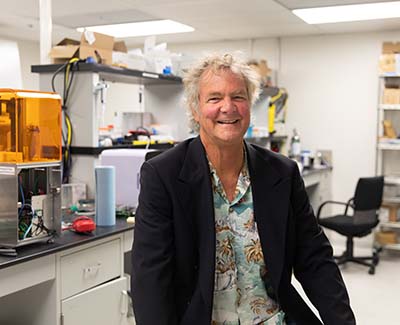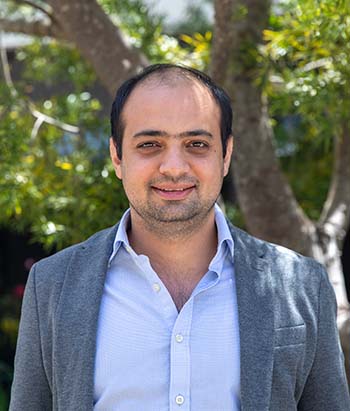Health
UC Santa Cruz to lead data collection center for major federal project on genetic underpinnings of neurological conditions
The UC Santa Cruz Genomics Institute will run the Data Coordination Center for the Scalable and Systematic Neurobiology of Psychiatric and Neurodevelopmental Disorder Risk Genes (SSPsyGene) Consortium.


The UC Santa Cruz Genomics Institute will run the Data Coordination Center for the Scalable and Systematic Neurobiology of Psychiatric and Neurodevelopmental Disorder Risk Genes (SSPsyGene) Consortium, a new major effort from the National Institute of Mental Health (NIMH) to study the 250 most important genes linked to a wide range of neuropsychiatric conditions.
A five-year grant from the NIMH, which is a branch of the National Institutes of Health (NIH), puts a UCSC-led team in charge of managing the large, complex data sets that will be created throughout this project. The data generation centers for the consortium will be: UC Los Angeles; Yale; Rutgers, Northshore University, University of Chicago, and Baylor College; and the Broad Institute and MIT. UCSC will also lead several outreach efforts connected to this project.
“Working with the data generation centers and the NIH, we want to standardize the phenotyping of neuropsychiatric conditions using a variety of models ranging from human stem cell models such as brain organoids and neurons, all the way to model organisms like zebrafish,” said Mohammed Mostajo Radji, a research scientist at the Genomics Institute and a co-investigator on the project. “We need to prioritize the most important genes underlying neurological conditions. We are particularly interested in genes that are involved in multiple neuropsychiatric conditions, and in which small mutations translate to major phenotypes”.
This grant will provide nearly $7.5 million in funding over the next five years. The principal investigators (PIs) of the Data Coordination Center will be David Haussler, Scientific Director at the UCSC Genomics Institute, and Tom Nowakowski, an associate professor at UC San Francisco, with Mostajo-Radji playing a key leadership role as well. Co-investigators will be Associate Professor of Molecular, Cell and Developmental Biology Olena Vaske, Associate Professor of Biomolecular Engineering Benedict Paten, and Genomics Institute Associate Research Scientist Max Haeussler. The program manager will be Catharina Lindley.
“Neurological disease attacks our spirit like no other disease, and so many families have had to cope with lifetime illness from it,” Haussler said. “This nationwide project is a frontal assault on the biological mechanisms behind neurological disease, building on more than two decades of genomic advances that UCSC is proud to have played a role in. We are very honored to have been chosen to be the coordination center for it.”
One of the first major tasks for the team at UC Santa Cruz will be to coordinate an initial selection of the 250 most relevant genes for the consortium to study out of the nearly 30,000 protien coding genes in the human genome. This selection will take place over the first three to six months of the project and involve a science-informed ranking and classification process, drawing on previous genome-wide association studies (GWAS) of neurological conditions.
They will also consider that some important genes may not be represented in past GWAS studies due to lack of sampling across diverse populations, which can cause researchers to miss genes that are less common among people of European ancestry.
After the initial genes are selected, the data generation centers will lead research on these genes over the next five years. This will help the researchers understand which genes and their specific mutations overlap in many disorders and therefore are important to study.
Multiple types of data will be produced that UCSC researchers will be tasked with coordinating into a cohesive story. These data will include genomic and physiological data of human brain organoids, as well as high-speed imaging of human neuronal activity, and behavior of zebrafish.The Genomics Institute’s data coordination efforts will emphasize standardization and accessibility across these data.
“This is the next frontier,” Mostajo-Radji said. “It took the wider genomics community several years of massive effort to standardize genomics, but at this point genomics is such a productive field because so much of the data is standard — anyone from anywhere in the world can see and understand the data because we all speak the same language. We have not gotten to this point yet with neuroscience phenotyping, but it’s time.”
The data will be available to the consortium members in a form quite similar to that presented by the UCSC Genome Browser, which is one of the most widely used genomics data repositories by scientists worldwide. It will be hosted in a data biosphere environment, a concept for modular and interoperable genomics data storage pioneered by Paten. They will also follow the FAIR principles, standards to ensure data is findable, accessible, interoperable, and reusable.
“We at the Genomics Institute have a history of structuring and making genomic data available to scientists and the public, from the human genome itself to the Cancer Genome Atlas and other major projects,” Haussler said. “The SSPsyGene project continues this tradition, and we will ensure data is easily and quickly accessible to everyone in the consortium at first, and ultimately to the public.”
Throughout the course of the project, the UCSC and UCSF researchers will strive to create a collaborative environment among the consortium members, and communicate with the larger neuroscience and genomics communities. They will also coordinate a series of capstone projects that will serve to test the data interoperability and fine-tune common data standards.
Outreach efforts connected to this project will include developing a class at UC Santa Cruz on neuroscience global health diplomacy that focuses on how communities of scientists are built around addressing neurological disorders.
The class, as with the overall consortium, will focus on how scientists can effectively ask a targeted research question across a population as diverse as the entire United States.
Mary Goldman, a Design and Outreach Engineer at the UCSC Genomics Institute, led the writing coordination of this grant, with help from Katrina Slater, former UCSC Genomics Institute Grants Management Specialist.